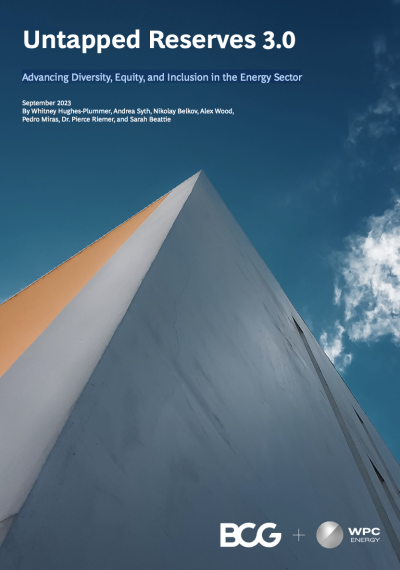
- Report year:2024
- Report author: By Whitney Hughes-Plummer, Andrea Syth, Nikolay Belkov, Alex Wood, Pedro Miras, Dr. Pierce Riemer, and Sarah Beattie
- Organisation: Boston Consulting Group
While diversity, equity, and inclusion (DE&I) is stated as a priority by many global energy companies, the energy sector continues to lag others in terms of representation and has been slow to make progress. These learnings are reinforced in the third version of the Untapped Reserves report, a collaboration between Boston Consulting Group and WPC Energy, which for the last seven years has monitored women’s representation in the global oil and gas industry.
This year’s report includes meaningful insights about the effectiveness of various DE&I efforts and interventions, along with perceptions of the challenges faced in advancing DE&I. Organizations with high levels of women in senior management typically have unbiased promotion practices, targeted recruitment programs, leadership compensation linked to performance against DE&I targets, and other foundational programs.
This report also is the first in our series to directly assess the medium-term impact of COVID-19 on DE&I in the energy sector. It is abundantly clear that the widespread adoption of flexible, remote, and hybrid working models has benefited women and other underrepresented groups. However, many energy companies are considering rolling back these changes, posing a risk to much of the progress that has been made in recent years.
For leaders in the energy sector, the recommendations in this report offer an opportunity to not only advance diversity, but to improve business resiliency and innovation in this rapidly changing sector.
This year’s report includes meaningful insights about the effectiveness of various DE&I efforts and interventions, along with perceptions of the challenges faced in advancing DE&I. Organizations with high levels of women in senior management typically have unbiased promotion practices, targeted recruitment programs, leadership compensation linked to performance against DE&I targets, and other foundational programs.
This report also is the first in our series to directly assess the medium-term impact of COVID-19 on DE&I in the energy sector. It is abundantly clear that the widespread adoption of flexible, remote, and hybrid working models has benefited women and other underrepresented groups. However, many energy companies are considering rolling back these changes, posing a risk to much of the progress that has been made in recent years.
For leaders in the energy sector, the recommendations in this report offer an opportunity to not only advance diversity, but to improve business resiliency and innovation in this rapidly changing sector.
